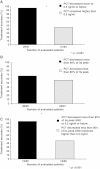Procalcitonin biomarker kinetics fails to predict treatment response in perioperative abdominal infection with septic shock
- PMID: 24156734
- PMCID: PMC4056026
- DOI: 10.1186/cc13082
Procalcitonin biomarker kinetics fails to predict treatment response in perioperative abdominal infection with septic shock
Abstract
Introduction: Procalcitonin (PCT) biomarker is suggested to tailor antibiotic therapy in the medical intensive care unit (ICU) but studies in perioperative medicine are scarce. The aim of this study was to determine whether PCT reported thresholds are associated with the initial treatment response in perioperative septic shock secondary to intra-abdominal infection.
Methods: This single ICU, observational study included patients with perioperative septic shocks secondary to intra-abdominal infection. Demographics, PCT at days 0, 1, 3, 5, treatment response and outcome were collected. Treatment failure included death related to the initial infection, second source control treatment or a new onset intra-abdominal infection. The primary endpoint was to assess whether PCT thresholds (0.5 ng/ml or a drop from the peak of at least 80%) predict the initial treatment response.
Results: We included 101 consecutive cases. Initial treatment failed in 36 patients with a subsequent mortality of 75%. Upon admission, PCT was doubled when treatment ultimately failed (21.7 ng/ml ± 38.7 vs. 41.7 ng/ml ± 75.7; P = 0.04). Although 95% of the patients in whom PCT dropped down below 0.5 ng/ml responded to treatment, 50% of the patients in whom PCT remained above 0.5 ng/ml also responded successfully to treatment. Moreover, despite a PCT drop of at least 80%, 40% of patients had treatment failure.
Conclusions: In perioperative intra-abdominal infections with shock, PCT decrease to 0.5 ng/ml lacked sensitivity to predict treatment response and its decrease of at least 80% from its peak failed to accurately predict treatment response. Studies in perioperative severe infections are needed before using PCT to tailor antibiotic use in this population.
Figures



Comment in
-
Monitoring treatment response in abdominal sepsis with procalcitonin--if only!Crit Care. 2013 Dec 10;17(6):1017. doi: 10.1186/cc13154. Crit Care. 2013. PMID: 24326175 Free PMC article.
References
-
- Goldmann DA, Weinstein RA, Wenzel RP, Tablan OC, Duma RJ, Gaynes RP, Schlosser J, Martone WJ. Strategies to prevent and control the emergence and spread of antimicrobial-resistant microorganisms in hospitals. A challenge to hospital leadership. JAMA. 1996;17:234–240. doi: 10.1001/jama.1996.03530270074035. - DOI - PubMed
-
- Chastre J, Wolff M, Fagon J-Y, Chevret S, Thomas F, Wermert D, Clementi E, Gonzalez J, Jusserand D, Asfar P, Perrin D, Fieux F, Aubas S. Comparison of 8 vs 15 days of antibiotic therapy for ventilator-associated pneumonia in adults: a randomized trial. JAMA. 2003;17:2588–2598. doi: 10.1001/jama.290.19.2588. - DOI - PubMed
-
- Singh N, Rogers P, Atwood CW, Wagener MM, Yu VL. Short-course empiric antibiotic therapy for patients with pulmonary infiltrates in the intensive care unit. A proposed solution for indiscriminate antibiotic prescription. Am J Respir Crit Care Med. 2000;17:505–511. doi: 10.1164/ajrccm.162.2.9909095. - DOI - PubMed
-
- Nobre V, Harbarth S, Graf J-D, Rohner P, Pugin J. Use of procalcitonin to shorten antibiotic treatment duration in septic patients: a randomized trial. Am J Respir Crit Care Med. 2007;17:498–505. - PubMed
Publication types
MeSH terms
Substances
LinkOut - more resources
Full Text Sources
Other Literature Sources

